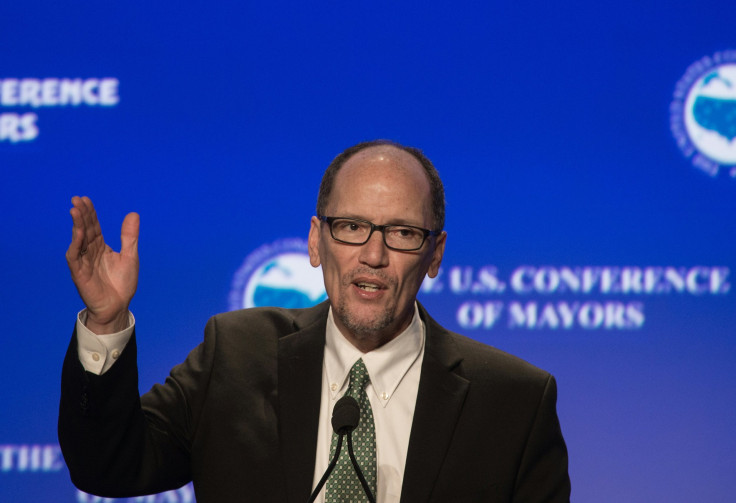Managed By Q: On-Demand Company Gives 5 Percent Of Equity To Workers As Labor Secretary Tom Perez Praises Employers Who Take ‘The High Road’

U.S. Secretary of Labor Thomas Perez likes to tout what he calls “inclusive innovation,” the idea that businesses succeed when they treat their workers well. And in New York City on Friday he showered praise on the labor-friendly model of one company in particular: an on-demand cleaning service provider called Managed by Q.
Flanked by Perez and one of the company’s cleaners, Managed by Q CEO Dan Teran announced the company would be giving stock options to its hundreds of cleaners, handymen and other field staff, extending 5 percent in equity over the next five years. Managed by Q has cast the plan as the first of its kind in the on-demand economy, the growing field of largely app-based companies offering services from transportation and pet care to wine delivery.
Unlike many of those businesses, Q classifies its workers as employees, not independent contractors, and provides them with benefits such as medical insurance and 401k plans. Perez praised the stock option plan — and the company’s general approach to labor — as a paradigm for creating broad-based prosperity in an era of digital innovation.
“When I see companies like Managed by Q, I see business models that work,” Perez said. “This is not an act of charity, profit-sharing, this is an act of enlightened self-interest. You go back 70 years and you see companies like Procter and Gamble who had profit-sharing, you see so many other companies who make sure they’re workers have skin in the game.”
The US @LaborSec quoting our CEO @dpteran. #bigday #sharedprosperity pic.twitter.com/QjcsN7t1Tl
— Managed by Q (@ManagedbyQ) March 18, 2016
Perez pointed to other companies he said are taking “the high road” and succeeding as businesses, including the Texas-based Container Store and Shake Shack, founded by restaurateur Danny Meyer. Meyer made shockwaves last fall when he announced an end to tipping at his company’s restaurants, which together employ 1,800 people, mostly in New York City.
Amid longstanding wage stagnation, widening inequality and an absence of many guaranteed workplace benefits, the Obama Labor Department has endorsed proposals to raise the minimum wage and mandate paid leave. But Perez said it’s also up to the private sector to do its part.
“We will be a partner, but we know the federal government and the state and local governments can’t do it alone,” Perez said. We need leaders like Dan [of Managed by Q], leaders like Danny Meyer; we need leaders like that.”
Perez later fielded questions from the press. He sidestepped a question about joining Hillary Clinton’s ticket as the Democratic vice presidential candidate, avoiding a definitive answer. It came after the secretary dodged a similar question earlier Friday on CNN. Earlier this week, Politico reported that Perez, who is well-regarded by a range of Democratic Party constituencies, was emerging as a “sleeper pick” to be Clinton’s running mate.
Some have pointed to unionization as the solution for lifting low pay and working standards in the on-demand economy. That's what the city of Seattle just did, for example. Last December, it approved a contentious law extending collective bargaining rights to Uber and Lyft drivers, even though, as independent contractors, the workers are excluded from the federal law covering union organizing and negotiating. A legislator in California unveiled a similar proposal this month. In a response to a question about these plans, Perez did not dismiss the efforts but did not offer an opinion.
“Regardless of the choices people make, to me, the north star is inclusive innovation,” he said. “There are a number of different ways to obtain inclusive innovation. You’re seeing in a number of models of collective bargaining being used. We’ve seen other ways to give people skin in the game. The key is to make sure we’re thinking long-term.”
International Business Times also asked the labor secretary for his thoughts on the brewing debate over a proposed third category of worker — a new classification to account for workers who supposedly fall somewhere in between employees and independent contractors. Amid the rise of digital work platforms, economists Seth Harris and Alan Krueger have called for the creation of the “independent worker” category. People like Uber drivers, Harris and Krueger argue, are neither traditional employees nor independent contractors, but share elements of both.
“I think Alan and Seth, who are both very good friends, have done a very important service by putting something out there for discussion,” Perez said. “For me, it’s too early to tell what the precise answer is.”
“I have a lot of questions and concerns,” he continued. “We’re looking into what the implications are, what are the unintended consequences? Would you perversely incentivize behaviors that wouldn’t be good for workers or businesses? Asking a number of questions that are critically important.”
© Copyright IBTimes 2025. All rights reserved.






















